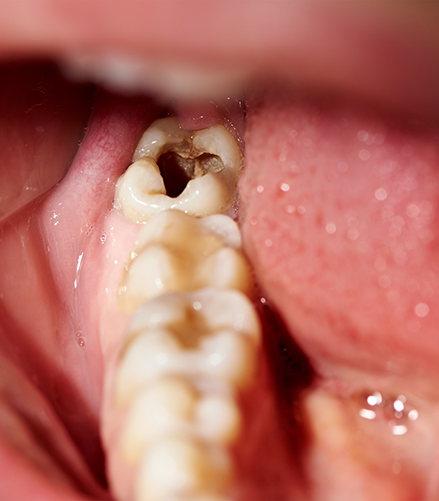Justin Garner Dentistry, LLC always strives to save teeth, but having said that, sometimes a tooth is too far gone to be restored. In those cases, we suggest (and can perform) tooth extractions in Independence to preserve your oral health. Through that removal work, we’d keep your smile safe from worse complications down the line.
Why Choose Justin Garner Dentistry, LLC for Tooth Extractions?
- Dentist Treats Patients of All Ages
- In-House Dental Implant Placement
- Same-Day Visits for Dental Emergencies
Reasons Why Tooth Extractions Are Necessary
A tooth extraction is a treatment of last resort, so we always consider other options – root canals, dental crowns, etc. – first. Our team will only suggest a removal when we think there’s no better alternative. To that extent, tooth extractions are needed for very severe oral issues, such as:
- A Spreading Tooth Infection
- Major Tooth Damage or Decay
- Dental Overcrowding
- A Wedged or Stuck “Baby” Tooth
The Process of Removing a Tooth
Before Dr. Garner begins, he will administer local anesthesia to make sure your mouth is numb. This will reduce any potential pain you might otherwise feel while we remove your tooth. If you could benefit from sedation dentistry, we can also provide the appropriate solution to keep you calm and comfortable while in the chair.
Once he is satisfied with your comfort level, he will begin to remove the tooth based on its current state – partially erupted or impacted.
If the tooth is visible above the gumline, he will perform a simple extraction that involves the use of specialized instruments to lift the tooth and gently move it back and forth until it detaches.
If the tooth exists beneath the gumline and has yet to erupt, it will need to be removed using a surgical method. This requires opening the gum tissue and dissecting the tooth so that it can be taken out in sections, so the underlying bone does not sustain additional damage.
Tooth Extraction Aftercare
Once your tooth is fully removed, it will be imperative that you abide by the post-operative instructions our team provides. Not only does this ensure successful healing but also prevents possible complications, like a dry socket.
Some of the most prominent guidelines you’ll need to follow as part of your aftercare include:
- Keeping your head elevated while you sleep so that the blood does not rush to this part of your body and cause throbbing pain.
- Eating softer foods to prevent unnecessary pressure from being placed on your mouth during the healing phase.
- Avoiding the use of tobacco products and not smoking, as this will inhibit your immune system, slow your healing, and increase your risk of a dry socket.
- Stay away from straws and do not spit, as these can dislodge the blood clot in the socket and cause a dry socket.
- Take over-the-counter pain medication as instructed to reduce inflammation and minimize discomfort.
Tooth Extraction FAQs
You should never leave a socket vacant after losing a tooth or having one extracted (unless it’s a wisdom tooth). Why? The reason is that the bone will begin to deteriorate over time, resulting in problems with your facial structure and the possibility of additional tooth loss.
To avoid these issues, you will need to talk to your dentist in Independence about your options for tooth replacement. These may involve custom dentures, dental bridges, or dental implants – prosthetics that can restore your appearance while also improving your oral function. Before we move forward with any of these solutions, though, we must allow the area to heal and determine your eligibility for additional treatment.
You do not need to worry about experiencing or feeling any pain during your extraction procedure. The reason is that Dr. Garner will administer local anesthesia before beginning to remove the tooth. If necessary, you may also receive dental sedation to calm your nerves and keep you relaxed while in the treatment chair.
It will take time for your anesthesia to wear off after you return home, but you’ll need to have an over-the-counter pain reliever nearby, as soreness is likely. This should only last a few days, though, and you can also combine medication with a cold compress to alleviate swelling and discomfort.
Smoking after tooth extractions in Independence is never a good idea. The reason is that it inhibits your ability to heal properly and efficiently. The ingredients suppress your immune system, so it will take much longer for your tissues and bone to recover.
It’s best if you can try and quit before having your tooth removed, but if you cannot, make sure you do not smoke or use any tobacco products for at least five days. If you can avoid it, try to wait two weeks before reaching for a cigarette, cigar, vape pen, or pipe.
If tooth extraction is recommended, it’s likely because your dentist does not believe your tooth can be saved or that any other type of treatment will be sufficient in achieving the desired results. It is never Dr. Garner’s initial suggestion, but it can be the most beneficial, especially if your oral health is at risk.
You can expect him to closely examine the affected tooth to determine whether less invasive treatment options will be enough to repair the damage or address the infection (i.e., dental crowns, root canal therapy, etc.); however, if not, he will suggest moving forward with tooth extraction to give your smile the best chance to succeed in the future.




